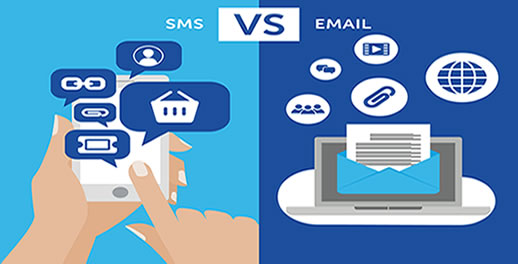Email vs. SMS: Comparing Effectiveness in Communication
In today’s fast-paced digital world, effective communication plays a vital role in both personal and professional interactions. With the advent of various communication channels, two prominent methods have emerged as frontrunners: email and SMS. Both email and SMS offer unique advantages and disadvantages, but when it comes to determining which one is more effective, several factors must be considered.
Email, a widely used electronic communication tool, has become a staple in both personal and business settings. Its popularity can be attributed to its versatility and ability to convey detailed information. Emails allow for long-form communication, enabling individuals to express complex thoughts, ideas, and instructions concisely and comprehensively. This makes email an ideal choice for formal communication, such as business proposals, project updates, or customer support queries. Additionally, email offers features like attachments, hyperlinks, and formatting options, which enhance the overall effectiveness of the message.
Another significant advantage of email is its asynchronous nature. Unlike SMS, email does not require immediate responses, allowing recipients to review and respond to messages at their convenience. This flexibility is particularly beneficial when dealing with individuals in different time zones or busy schedules. Moreover, email provides a reliable and traceable record of communication, making it easier to reference past conversations or track important information.
However, email also has its drawbacks. The sheer volume of emails people receive on a daily basis often leads to information overload and a higher chance of messages being overlooked or lost in the cluttered inbox. This can result in delayed responses or missed opportunities. Additionally, email may not be the most effective channel for urgent matters that require immediate attention. With spam filters and promotional tabs, important emails may inadvertently end up in the wrong folder, causing delays or missed communication altogether.
On the other hand, SMS, or Short Message Service, has gained widespread popularity due to its simplicity, speed, and high open rates. With SMS, messages are delivered directly to the recipient’s mobile device, ensuring a higher likelihood of the message being seen promptly. SMS is often used for time-sensitive information, such as appointment reminders, event updates, or emergency alerts. The concise nature of SMS, limited to a maximum of 160 characters per message, encourages brevity and prioritization, making it an effective tool for quick and direct communication.
SMS also boasts an impressive open rate, with studies suggesting that nearly 98% of text messages are opened within a few minutes of receipt. This immediate accessibility makes SMS an ideal choice for urgent or time-critical messages. Furthermore, SMS does not require an internet connection, making it more accessible in areas with limited connectivity or during network outages.
Nevertheless, SMS has its limitations. The character limit poses a challenge when conveying detailed or complex information, and the lack of formatting options restricts the visual appeal of the message. Unlike email, SMS does not support attachments or hyperlinks, limiting the ability to share supplementary materials or direct users to external resources. Additionally, the personal nature of SMS may not be suitable for formal or lengthy communication, as it may be perceived as too casual or intrusive in certain professional settings.
In conclusion, determining the effectiveness of email versus SMS depends on the specific context and communication requirements. Email excels in conveying detailed information, facilitating formal communication, and providing a record of correspondence. It is best suited for situations where time is not a constraint, and a comprehensive message is necessary. On the other hand, SMS shines in delivering time-sensitive, short, and direct messages that demand immediate attention. It is a valuable tool for urgent communication or when an instant response is desired.
Rather than pitting email against SMS, it is crucial to recognize the strengths and weaknesses of each channel and use them accordingly. Leveraging both email and SMS strategically based on the nature of the message, target audience, and desired outcome can enhance overall communication effectiveness. Ultimately, the key lies in understanding the context, purpose, and audience to make an informed decision about which channel to employ to achieve the desired communication goals.
Looking for USSD for voting competition, click here

